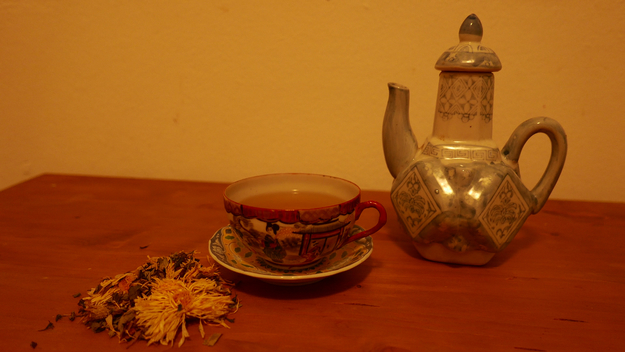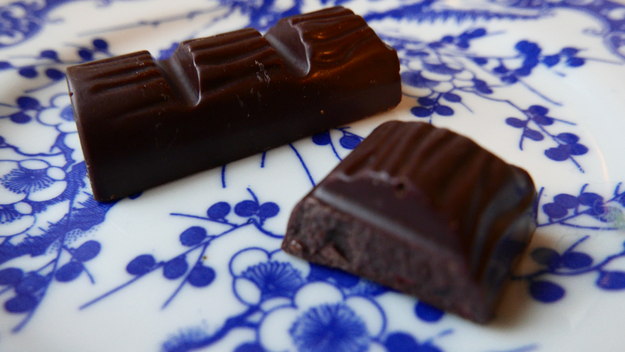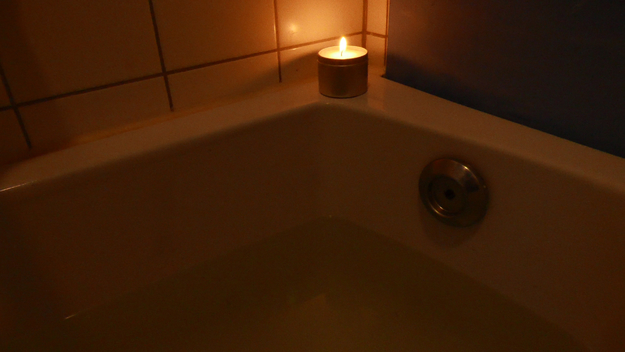Project description
Here is an overview of the concept and format of the "Multi-sensory listening rituals" that will be developed
— Ritual to encourage the practice of taking a break from a stressful task
- Blend of tea + musical track
- Activates the brains default mode network
When we are stressed over completing a creative task, especially when we are under the pressure of a fast-approaching deadline, it is easy to get into the state of mind that we do not have time to take a break. But, recent advancements in neuroscience have shown how important taking a break from a task can be in helping us to more easily creatively solve it and therefore reduce the level of stress we will experience.
Previously it was thought that our brain switches off entirely from solving a task when we stop what we are doing and put our focus on something else. However, recent scientific research has shown that when we physically move away from a task and focus on something else, the part of the brain called the default mode network goes into overdrive. In this context, the default mode network subconsciously aids us in coming up with creative solutions to the task we have taken a break from.
This 'Multi-sensory listening ritual' helps people access the power of their default mode network by encouraging them to take a break from a stressful task and go and make a cup of tea. They are then guided to fully focus their attention on the experience of listening to the musical track and the tea (as they drink it). The sensory qualities of the tea and soundtrack will be composed to be complex and demand attention to aid in taking the listener's attention away from the task they are taking a break from. In addition, the nutritional qualities of the tea will be composed to reduce levels of stress and raise levels of focus for when they return to the task.
— Ritual to encourage the practice of not making unhealthy food choices when stressed
- Bar of no sugar raw chocolate + danceable musical track
- Activate good brain chemistry
Our decision making can be impaired when we are stressed out. For example, high-stress levels often lead us to make unhealthy food choices, seeking temporary relief from stress by eating highly processed and sugary foods. But in fact, these kinds of foods make us more stressed because they cause physiological stress responses in the body, which in turn send stress signals up to the brain. This kind of eating is less about responding to hunger and more about eating with your emotions. I, for one, am familiar with the negative feeling of being even more stressed than I was before whilst lying slumped on my sofa, regretting having consumed a massive bag of chips in what was an unsuccessful attempt to find solace from stress.
On the other hand, food such as Raw chocolate can help reduce stress levels. Raw chocolate is produced from unroasted cocoa that does not contain any additives like sugars. It has many delicious health benefits, particularly in improving emotional states. Studies have shown that consuming it can reduce levels the stress hormone cortisol. It also contains high amounts of phenethylamine, which triggers the release of endorphins and mood-enhancing neurochemicals (i.e. serotonin and dopamine). The body releases these same chemicals when we have sex, fall in love or take the drug ecstasy.
This portable and pocket-sized 'Multi-sensory listening ritual' offer stressed-out people an emergency mechanism to help them avoid making an unhealthy food choice that will increase stress levels. The ritual guides the user to carry the bar of raw chocolate with them and begin playing the musical track through headphones and consume a piece of the chocolate when they are stressed and start to think about eating something unhealthy. The ritual instructs the user to listen to the uplifting flavours in their mouth and repetitive beats of the track whilst dancing. This sensory experience will reduce the levels of the stress hormone cortisol in the users body and make them feel euphoric as their brain releases endorphins, serotonin, and dopamine. Being in this state of mind will reduce the desire to consume unhealthy foods.
— Ritual to encourage the practice of relieving stress through mediated nature
- Scented candle + musical track
- Brings the stress relieving benefits of being immersed in a forest directly to your bath tub
In Japan, people are encouraged to undertake a mindful practice called forest bathing, or shinrin-yoku. Shinrin in Japanese means “forest,” and yoku means “bath.” Shinrin-yoku means bathing in the atmosphere of the forest or taking in the forest through the senses. Although forest bathing is about engaging all of the senses, within Japanese culture, forest bathing focuses on inhaling through the nose antimicrobial organic compounds derived from trees, including such wood essential oils as pinene and limonene. Research carried out by Japanese neuroscientists has shown that people who regularly engage in the practice of forest bathing are dramatically less stressed than those who do not .
Today many of us have busy and stressful lives in cities and do not have easy access to nature . Meaning it's harder for us to take advantage of the stress-relieving effects of spending time immersed in natural environments. However, scientific studies show that mediated (recorded) experiences of nature (e.g. hearing a recording of bird songs ) can also positively affect us and reduce stress levels.
This 'Multi-sensory listening ritual' helps busy stressed people access the stress relieving affects of being immersed in the sensory environment of a forest from the comfort of their bath tube. The stressed person is guided to take along hot bath whilst listening to the scented candle and musical sound track mediate the sensory experience of being deep inside a forest. The relaxing qualities of the ritual are magnified by it taking place in a bath, as scientific research has shown that having a long hot bath dramatically reduces stress.
Possible ways to expand the project
- Research & Development
I will begin the project by researching and curating three 'Multi-sensory listening rituals' using compositions of ingredients, molecules, notes and melodies that will be selected for their stress-relieving qualities. I will collaborate with established experimental musicians to create the musical elements of the rituals. Each of the three rituals will be designed to address a particular behavioural pattern that leads to increased stress levels.
- Test & Evaluate
In the project's next stage, 150 participants will be given a stress-relieving pack that contains the three 'Multi-sensory listening rituals'. First, participants will be guided with instructions on how they might integrate the rituals into their lives to help them to reduce levels of stress. Then, throughout a month, participants will be asked to report the effects of the 'Multi-sensory listening rituals' on their stress levels. The participant's responses will be analysed, and the findings will be used to improve the stress-relieving capabilities of the rituals.
- Present & Discuss
The 'Multi-sensory listening rituals' and the findings of the study on them will then be presented as an exhibition at Mediamatic. I envisage that the show would also highlight perspectives and information on what makes modern society so stressful to live in. Furthermore, it would be my aim that the exhibition instigates a broader discussion within the creative community and society in general on the need for developing mechanisms and rituals to aid people in reducing the stress they live with.
- Expand & Dream
Moving forward beyond the exhibition, depending on how successful the 'Multi-sensory listening rituals' are at reducing stress levels, I can imagine expanding the project by developing more rituals to address other behavioural patterns that lead to increased stress levels. For example it would be useful to develop a 'Multi-sensory listening ritual' to distract people from the stress which is caused by constantly checking how many likes their post of social media is receiving. I can also envisage exploring the possibility of making the 'Multi-sensory listening rituals' commercially available to the public. As I imagine it now the dream goal of the project would be to develop a brand that would specialise in using scientific knowledge to create analogue multi-sensory rituals that will create mechanisms to increase happiness, wellbeing and health within society.
Personal introduction
I am a multi-sensory artist & creative researcher. The integration of design and research is key to my approach. I am deeply fascinated by the new understanding of how our senses function and collaborate that has begun to take shape since the turn of the 21st century. This body of research suggests a ‘multi-sensory organisation’ of the brain, with much less modular functions than previously understood. For example it has been demonstrated that what we hear while smelling something affects how our brain perceives the smell.
I am passionate about infusing scientific knowledge of how our senses collaborate into playful approaches to multi-sensory storytelling in order to create experiences of narratives that are more pleasurable, meaningful, emotional, and magical.
Estimated costs
- 250 € - Material for developing the ‘Multi-sensory listening rituals’
- 1500 € - 150 stress relieving pack that contains the three ‘Multi-sensory listening rituals.
- 3500 € - Artist fee
- 750 € - Three musician fees of 250 €
If money was no object
I would love to broaden the cultural perspectives of using multi-sensory experiences for healing purposes that would be presented at the exhibition. In particular, it would be a dream come true to invite a shaman from the Shipibo-Conibo people of the Amazon rainforest in Peru, to attend the exhibition.
The Shipibo-Conibo, understand medicine to literally be art and have a traditional healing practice called Quiquin, which places a focus on synaesthesia. Quiquin means both aesthetic and appropriate, and refers to pleasant auditory, olfactory and visual sensations. Quiquin is administered by a shaman who treats his patients by bringing them into an environment he has created to be correctly aesthetically pleasing (Quiquin) for the condition the patient is being treated for. The Quiquin of the shaman always employs sensory experiences from three sensory modalities: auditory, olfactory and visual. I would be my plan that the shaman would preform Quiquin on people attending the exhibition
This proposal is part of the 'Penny for your Thoughts' project 2022.


